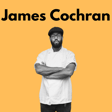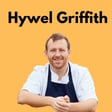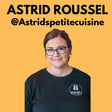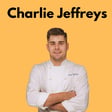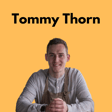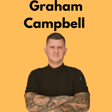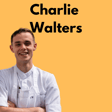Become a Creator today!Start creating today - Share your story with the world!
Start for free
00:00:00
00:00:01

Guillaume Zika - Organising the Culinary Mind
Guillaume Zika is the chef-turned-developer behind Chef Notepad, the app designed to make a chef’s life simpler — no small feat in a world of recipes, margins, and chaos.
In this episode, Guillaume shares how he built a powerful, intuitive tool that takes the complexity of menu planning, costing, and organisation, and turns it into something chefs actually want to use. We dig into why chefs notoriously hate doing costings, how tech can truly serve the kitchen, and what it takes to build an app that feels effortless — even when it’s anything but.
Transcript
Introduction to Guest and Chef's Notepad
00:00:01
Speaker
Welcome, welcome, welcome back to the Check On podcast. I'm your host, Kasei Fraser, and if this is your first time listening, welcome. If you're a day one listener, then welcome back.
00:00:12
Speaker
Tonight we're chilling with Guillaume Zika. This is the chef that built the chef's notepad, a game changer for recipe costing and kitchen flow. We're going to hear about how he turned his chef life into a platform that cuts the chaos, keeping your kitchen running smoothly, and honestly, takes out the scariest part of being a chef.
00:00:31
Speaker
Please enjoy Guillaume Zika. Hello. Ah, we can hear each other. You can hear me?
00:00:45
Speaker
oh oh ah the yeah can eat me I can hear you. Can you hear me all right? Yeah, yeah. I never use this one, but my ear pod doesn't really work well sometimes, so thought this one would be better.
00:01:02
Speaker
have you been? Have you had a good day? Yeah, good. Yeah, good day. Yeah. the um A lot of energy day, you know, one of those days when everything goes to plan. It's good.
00:01:14
Speaker
That's a good day then. Perfect.
Guillaume's Culinary Journey Begins
00:01:18
Speaker
um I wanted to start with sort of where you did your apprenticeship, how you got into cooking and sort of really right back to the start, if that's okay.
00:01:29
Speaker
Yeah, of course. So where did I start? um Well, I got into cooking because, pretty much because of my dad. My dad was a chef for for for a long time and I always used to see him cooking at home and I knew he was a chef. and And the fact that I was not the most brilliant student at school, i got given the choice of becoming a chef from the school.
00:01:55
Speaker
So i was like, um sure. Sure. and And I started like this and on the beginning, and you know, like, I mean, as you start when you're 16 or 17, it's not like the things that passionate you the most. But I was really determin determined to um to work in an amazing restaurants.
00:02:16
Speaker
I really wanted to work in two and three Michelin style. That was my goal because I always thought that if I start hard, I can always go back and working in easier places.
00:02:28
Speaker
um And so I started in a place called Rollet Louis 13. I was in Paris, a Tremisland star. And the the chef, his name was Manuel Martinez, a crazy guy, crazy chef.
00:02:47
Speaker
So he was a, he was a moth. Yeah, big reputation. Do you know him? I know of him, yeah. I don't know him personally. Yeah. So he had a muff.
00:02:59
Speaker
I don't know if you know what is. Like, you know, when you've got the blue, white, red... Ah, the mustard front. Yeah. but Yeah. And so he used to be the chef of La Tour d'Argent before, in these famous restaurants. And he got fired because he was too doji.
00:03:17
Speaker
So he opened his own little restaurant. it On what on the what I remember, and maybe don't quote me on that one. he's what And anyway, he he was it was it was a great first place to learn. And and I think the fact that I survived the time that I was there...
00:03:37
Speaker
um helped me to to to keep ah to keep pushing in Michelin star restaurants. um and But yeah, it it was a good adventure. I remember, I mean, one day there was very small restaurants, I think about 40, 45 seats.
00:03:56
Speaker
and um And obviously it was a really well-known MOF in the industry. So a lot of people that were trying to become MOF to do the competition, they were coming in our kitchen to train. It was only a small kitchen. We had maybe four or five chefs in here.
00:04:14
Speaker
ah But we had all those those people coming to train and other masters of France were coming to train. those organization says At some point in the kitchen, we had four in this in that tiny kitchen, we had four um chefs with with the cola, the French cola. It was pretty impressive.
00:04:34
Speaker
um and and intimidating. It was great experience. what What year are we talking? What year did you start your apprenticeship in that direction?
00:04:46
Speaker
um Well, that's a good question. I was, think I was 18, which means that was 22 years ago. So 2002. eighteen which means there was swa twenty two years ago so two thousand twenty two thousand and two long time, isn't it?
00:05:05
Speaker
I imagine it must have been sort of a um very different environment to what kitchens are nowadays that, you know, sort of young chefs are growing up in oh how How long did you spend there? what what was it What was it like? Because I guess I don't really, I've never really known what sort of tough French kitchens were like back then.
00:05:28
Speaker
um Well, it it was... um he was ah It was long hours and was lot of like very intense and stress and stressful time. Not like, I mean, every kitchen is stressful. I mean, maybe not those days anymore, but it was long hours and was a lot of pressure getting put in the kitchen. mean, those days you were allowed push people.
00:05:55
Speaker
Not, not not and sorry, not physically pushing, but like to really put pressure verbally to people and to yell at them. Not that like, and it's It's funny, but I never really
00:06:13
Speaker
But you always think that one day it's going to your turn. and But it never really, really happened. It happened a couple of times later on, but on the early stage, never really. But it is very stressful. In these long hours, you start at 7.30, 8 o'clock, and you have a maybe an hour or a couple of hour break in the afternoon.
00:06:32
Speaker
And then you jump on the on the on the night service and you finish up 10.30, 11, 11.30. and thirtydy eat ever and eleven thirty And then you go to bed and you go back. So I remember when I was, so I went to school where I was. I was doing two weeks at school, maybe one week.
00:06:50
Speaker
and It was long time ago. So two weeks at school and two weeks at work. ah you take You've got a rhythm when you're at work, ah full time, working five days a week.
00:07:01
Speaker
uh and and those long hours that when I was going back to school it was it was almost you were bit jet lagged and I was literally sleeping at school I was that I was still not a good student but I think I was okay in a kitchen his not funnyy the sorry it must have been really hard to kind of Because you're getting into that rhythm when you're at work and then like, yes, going back
International Culinary Adventures
00:07:30
Speaker
to school, but then to try and jump back in the kitchen and, you know, like two weeks is a long time.
00:07:36
Speaker
So to have that break for two weeks and then to come back in, it must sort of almost feel like you're not starting over from fresh, but almost each time. Yeah. Yeah. It yeah it it was um just catching up the rhythm again. It was strange.
00:07:50
Speaker
Yeah. It was almost you were going on holiday for a couple of weeks at school and then you were going back to work. Very much. But it didn't scare you off though. It didn't sort of scare you away from sort of that style of the industry.
00:08:04
Speaker
No, it didn't scare me. It didn't scare me. I mean, yeah were you know, you've got some bad days and some good days. i mean, it's, um it's um yeah, no, it eating didn't scare me off. and And since then, after that, I was still determined to to stay in Michelin Star restaurants and I kept going in it.
00:08:25
Speaker
you've got a very sort of very wide resume from the places that you've worked, sort of from from France to USA to England and now to Australia. Was that a very conscious choice? did you Did you know that you wanted to move around to different countries?
00:08:42
Speaker
um No, never. I mean, my dream when I was, when I started becoming becoming like like a chef, not not so much on the early stage, but when I started really touching you know, working and start prepping fish and meat and cooking properly, not when you're pitting obviously shallots and parsley the whole day. But when I started when i started getting to it, ah my goal was really to become one of those chefs in those those really renowned venues.
00:09:15
Speaker
And and it it was not even to own my own restaurant. I just really wanted to become one of those famous, not this fish especially famous, but really one. to share that the that cooks in one of those two Australian Michelin style. and and and And I didn't really think too much of traveling.
00:09:35
Speaker
so when I was in Paris, I was pretty young. My my parents moved in the south of France and um and and i decided and I decided to move with them. So I went in the south of France and I spent two or three years in in a place called Le Moulin de Mougins.
00:09:52
Speaker
Um, it was, uh, you know all days, Roger Verge, who was, um, who was, um, who was cooking over there, but then Alan Lorca, another chef took it over and, uh, we had to Michelin star. And I really started like learning and loving the food over there.
00:10:11
Speaker
And then I wanted to come back to Paris. So i went back to Paris for three years. and And then I just wanted to see something else. So I started fishing around to what country or what city I could i could move. and and this is why this is how my journey to go overseas. And since then, I think I was 25 when I moved overseas.
00:10:35
Speaker
Since then, and I and never came back. And I don't think I'll hope be i'll be back either. is one of those weird that same thing that um excuse me It's one of those weird things that when you move away from your home country to go and discover other things, there's either the people that really, really want to go back home or the people that are like, I don't think I'll ever move back to to where I came from. It's a really weird kind of thing, I think.
00:11:06
Speaker
Yeah, it's... um It's, I mean, yeah, it all depends really the experience. So you go home, how close you are with your friends and family, if you want if you miss them. But yeah, I mean, right now, in my opinion, i think in France, there's a little bit too many ah too many French people to my taste.
00:11:27
Speaker
So this is why on I'm staying. I mean, Australia is quite far.
00:11:34
Speaker
It's funny, you're not the first French person. No offense to the Frenchies, but really... i read a I read an article the other day that was saying that um that France, the best time to visit France is um is in August because everyone is on the holidays and everyone is happy and most French people left the country.
00:11:56
Speaker
No, but is it's a it's an amazing place, I think, to be able to grow up and have such a deep food culture. I mean, I don't think I've ever been anywhere where each region sort of has, you know, a couple of different specialities and they're very protective over it and Even the produce that you have, you're very protective over it. And i don't know, I don't think I've ever been anywhere. Like, yeah, there are other European countries, you know there's Spain and there's Italy that also have very deep food culture, but nothing quite like what you have in France. I think that's a very amazing experience to, even if you don't become a chef, to grow up in and have that knowledge and that respect around food.
00:12:36
Speaker
It's not something that we really have in Australia, if you know what I mean. No, and and and you're right. It's it's pretty incredible. Like and every time I go back and I picture in my head and I was like, ah I could actually live here.
00:12:51
Speaker
But then when I think of the everyday life and things like, you know, when you go on holidays, you know, i' like oh I could live here. when i like But it's true, the product and the culture and and the architecture and the yeah and And also, um I'm saying this to the French people, it's not entirely true. you know like I actually love talking to them. I love their humor, I love their tradition, the culture, all their restaurants, the bistro. It's incredible. There is every single restaurant.
00:13:18
Speaker
I mean, I'm talking more Paris, but that's where I'm from. Every single restaurant in every little corner, is they're busy. They're busy. You get in there. Australia is very important to have, for example, music in restaurants.
00:13:31
Speaker
It creates that mood, but you you get in a restaurant in Paris, a little bistro, there's no music. The only thing you hear is everyone chatting. and And it creates that thing. It creates that the mood that um ah most restaurants those days try to camouflage with carpets and extra music to to just to to don't have that. But
Creation of Chef Notepad
00:13:53
Speaker
and I don't know, it's magical.
00:13:55
Speaker
It's really magical. Every time like I come back in France, I'm... um yeah, I'm in love. I'm in love again. are you know It's um ah emotional.
00:14:07
Speaker
Yeah, I think it's nice to go back and kind of remember for a moment what it's like and and how good it is. I think it's really funny you mentioned about the music. um Just a little bit of a side note. I remember the first time I went to France.
00:14:19
Speaker
I was quite young. went over in 2017. I think I have been like 21 or something. twenty one or something And I went into a restaurant and i felt so uncomfortable and then I realised that there was no music playing.
00:14:32
Speaker
And in my head I'm like, why don't they have any music? Is it to do with the music licensing or like what's going on? It's just totally normal for most people. But me, I was like, I feel so uncomfortable.
00:14:44
Speaker
Yeah, it's funny. It's bizarre what go out with. Yeah, it's just you different ambience. Very different ambience. I mean, the other day, at a Tropic where I work at the moment, we had a um ah we had a fair bit of rain lately.
00:15:00
Speaker
And so we've got a big terrace. Normally we open all the doors and everything. and and And that day, we obviously had to shoot. The wind was pretty strong as well. so we had shoot the terrace and shoot the doors.
00:15:12
Speaker
So everything, everyone was inside. And we're not used to normally, obviously having all the doors open, it makes the noise go away and it makes, you know, like, so sorry, the noise of the the people talking and laughing and screaming sometimes here. That's what they do in Australia, they scream.
00:15:27
Speaker
um But yeah. Yeah, the fact that we had everything shot, it brought that similar ambience that we've got in in those restaurants in Paris. And we like it was hard actually to do anything with the music because the louder we were putting the music and the louder the people would be.
00:15:45
Speaker
so So we just left the music slightly lower on the background and was all those people chatting. And one of the madder-discounts was like, oh, it's loud. It's a bit loud. like You can really hear the people. And I was like, I kind of like it.
00:15:56
Speaker
Yeah.
00:15:59
Speaker
Kind of brings you back home. Yeah. It's good change. What kind of cooking did your dad do? You said your dad was a chef when you were growing up.
00:16:12
Speaker
Yeah, he was it was very traditional. It it never really worked. and I think he'd done some good restaurant when he was young, when he was very young, but afterwards he went to ah to more I mean, he had his own actually restaurant called Les Vallons in Montparnasse.
00:16:35
Speaker
Where was he again? Austerlitz. Actually, I can't remember. Anyway, he had his own restaurant with with his his mom. My mom was on the floor.
00:16:47
Speaker
His mom, my grandma. And it was kind of like a family restaurant. And then the lease went up and there and and they stopped doing it. But it was really traditional bistro food. and It was very trendy and was working really well.
00:16:58
Speaker
and and But then he started working more in ah in places um like, how do you call them? You know, when you yeah you cook for all this, like more like a function, well, like pension,
00:17:15
Speaker
pension places, you know, where you cook a lot of meal for a bunch of people that live there. I don't really know how to explain it, sorry. But yeah, he he he kind of left the um the yeah the the restaurant, the bistro restaurant industry and went more into your corporate dining thing.
00:17:38
Speaker
Do you think that that had a lot of influence on you wanting to become a chef or was it more sort of the school pushing you towards it?
00:17:48
Speaker
um sir I think something that ah re ah really pushed me on and becoming a chef was, yeah yeah, the school was one thing, obviously, and the fact that I actually had no idea what I wanted to do when I wanted to be a sports teacher.
00:18:09
Speaker
But then I realized how much study you had to do and like just you just came out of my head straight away. um and then And then the fact that like themen you know the of pleasure that you can bring to people through food is actually incredible. The amount of emotion you can bring to food.
00:18:33
Speaker
And when you cook something nice and you can be at home, you can be in a restaurant, you can be anywhere, when you cook something nice, And to see to see the joy in people and and people that are like, wow, this is amazing. And it's so rewarding. And I kind of grew up with that. My dad was not especially cooking so much on the on the everyday life at home. My mom was doing a lot of the cooking, obviously because he was working.
00:18:58
Speaker
and But every time we had a birthday Christmas or things like that, he was in one in ah like in a pan and he was doing incredible. I mean, I didn't really understand it so much when I was, when I was young, but I could see that everyone was just blown away and they were like, wow, you know, you're amazing, you know? And I was like, and and know I wanted to be that person that when I cook and people almost like, wow, you're amazing. You know, he's like, it's rewarding to, to, to get celebrated like this.
00:19:27
Speaker
Um, so that was one of my motivation to, um, to be, and I remember when I decided to be a chef, he said to me, um he said, you know, listen, you need to understand that it's a hard job. It's not something easy to do. And I was like, yeah, that's fine. I can do hard things. Like, it's it's it's good, you know. And he was like, you said, you know, there's two good things about working in hospitality. It's like, first, you'll never be hungry.
00:19:58
Speaker
You know, you're always going to put on your table and and you're going to also... of this this family, which is which is work and you're going to those people that you spend so much time with and there's that big camaraderie that you have in the kitchen that you don't have in any other industry. I mean, probably you've got in some industry, but collect it and rate the camaraderie in the kitchen is very special.
00:20:30
Speaker
It's very, very special and and an unique. um and And he was right. It is hard work. But I found a fine my family, especially for me being, but I've been away from home now for
00:20:46
Speaker
over 15 years probably. when i Yeah, over 15 years. and um But I always worked in the kitchen and and I never felt homesick.
00:20:57
Speaker
I mean, sometimes for Christmas, but you create that that that connection with all the people you work with. And it's it's like having a family. I think there is something very special in that knowing that, you know, you can move country on your own and go work in a restaurant and it's a little bit of comfort knowing that, yeah, okay, it's gonna be a bit scary and a bit stressful to start with, but you will have this little sort of insular community that you have from a restaurant, no matter where you go, there'll always be someone or, you know, a group of people from the restaurant, whether it's from the kitchen or from a house that you will connect with and you'll go out for a beer and you'll,
00:21:38
Speaker
hang out you might flat share with some of them or whatever but there will be that community no matter where you are whether you're with someone or not and it's almost your um your safe space when you're not yeah when you're not in the shit in the kitchen but
00:21:59
Speaker
now but like lot of people consider work as as as going to work being like oh i gotta go to work but but when When you love, i mean, it's true, working in a kitchen, in in hospitality, you you get passionate about it and you actually get excited about going to work.
00:22:15
Speaker
I mean, like, talking for me, i know a lot of people don't, especially those days, but they still call it work. it's ah You get excited about spending time at work. You get excited about touching good product, creating good dishes and and and being in shit and, and and you know, and do all this cleaning and this filthy thing.
00:22:35
Speaker
And And but um I'm selling the dream, I'm like.
00:22:44
Speaker
No, it's true. And it's your comfort zone. you go When you're a chef, you move in in in a country to to work in restaurants.
00:22:56
Speaker
You don't move to enjoy the life and then eventually find a job. you know I mean, when you obviously a big carrier or something. Yeah, I think that's one thing that I didn't realize enough when I moved out of Australia. I was like, oh, you know, i'm going to I went to New Zealand first, but when I went to Sweden, I was like, it's going to be amazing. I'm going to see so much of Sweden. and I'm going to see so much of the culture.
00:23:18
Speaker
I saw nothing in Sweden. It was just full on work. I was very disillusioned with how, sort of how much I was going to actually see. And don't get me wrong, we went on a couple of like weekend trips here and there. But no, it was just fully immersed. It was my first time working in a Michelin star restaurant, um like properly, not just staging.
00:23:37
Speaker
So yeah, it was um it was not a lot of sightseeing and travel and lots and lots of work, but amazingly so, amazingly so. Yeah, yeah. What was it like? You create different memories.
00:23:49
Speaker
Yes, I've got a lot of work memories. What was it like um working with Thomas Keller? um It was good. It was good. It was a very special experience.
00:24:04
Speaker
I learned a lot. I learned a lot with, in terms of structure and the perfect, you know, well everything is just perfect.
00:24:17
Speaker
um I personally didn't enjoy it.
00:24:23
Speaker
ah so was it Not that I don't like structure, but it was it was very... yeah there was not i I come from... i come from i mean So when I arrived over there, at first my English was not the best as well.
00:24:37
Speaker
And it was really my first real experience you know in country. you and as a country And I came from a place, Le Vifaux in Paris. was a St. Michelin star and I spent three years there. It was a very different um atmosphere in this kitchen than over there.
00:24:56
Speaker
It was a lot of freestyling, a lot of like crazy everyone running around, chatting around. theres a lot of It was the jungle. And then you arrive in Percy where everything is square.
00:25:11
Speaker
yeah like i'll remember I remember I got asked to to to turn an art shook and I start turning it and then the sous chef said, no, no, you need to turn it this way. And I was like, okay, the reason which is the same is like, yeah, yeah, but you need to turn it this way.
00:25:27
Speaker
was like, okay, you know, and so and and then it happened the same with, um, we were doing some, some LAMRAX and, uh, and I said, oh, I'll show you a way. Like that is, I, it's very fast. And I've done so many LAMRAX when I was in Paris and I show him, it was like, oh yeah, that's pretty fast.
00:25:45
Speaker
That's the, the results is really good, but let's do the other way. Okay. Okay. So it was lots of this and the the pressure, I don't I didn't feel. I didn't feel, and and this is me, don't think don't don't make me wrong, it's a place and everyone raves about yeah the whole Tom Askela family and and all these things. But I don't think I was you in a good space in my head. and and i don't I don't know, like but I didn't feel like, ah I didn't find that much soul when I was there.
00:26:20
Speaker
um but maybe because my English was not the best and the the pressure that I had on me ah was was but pretty high was during the recession as well. So like a lot of people were getting fired ah um because the restaurant was not busy enough and um and and everyone was quite stressed about it and ended up getting fired as well because I came late two, three times.
00:26:45
Speaker
um and and But when they fired me, I was so happy.
00:26:52
Speaker
I was so happy, you know, because, because I, and I, and they felt it as well. and I was so happy because I, I was not, I was not so happy over there, but I learned a lot, like in terms of the culinary wise and, and, and structure and how to cut the tape very straight and that's, you know, all these things, like you, you just learn a lot. And in the time that I spent over there was very, very precious. And he, um, he gave me a lot, uh, through, through, through all the years after.
00:27:23
Speaker
It's a very strange experience, it sounds like. You know, like, you've probably, like, you've just come from three Michelin style. Was that with Guy Martin, your last restaurant in Paris? Yeah.
00:27:36
Speaker
You know, you've just come from a really sort of big name restaurant and then you've gone to this place in America. They've probably got, some expectations on you as well. But the sort of the culture, kitchen culture shift must have been massive. You know, I've heard that it is a very, very strict regimented kitchen. Was there a lot of kitchen banter or anything like that? Were people talking and laughing or was it all very sort of quiet and just do your job?
00:28:01
Speaker
No, it was pretty quiet. It was it was a bit of a family atmosphere and people like people were very friendly. I was not. um and i didn't i didn't feel it but and ah i didn't I didn't feel it myself, but I know it was there. I know because people were hanging on a lot and and very friendly with each other. I felt like um maybe I was a bit of an outsider and people like, I don't know. Yeah, it was slightly different.
00:28:31
Speaker
But in saying this, you know, like ah David Braden, which is now the head chef for um for the French laundry, I spent because I was over there during Christmas and I spent Christmas with him and his family.
00:28:45
Speaker
I did also Thanksgiving with some of the staff. They invited they inviteded me in their home. And so it was that that ah family thing. But overall, and it's also because you know I was in a new country. It was the the real first time that I was out far from home.
00:29:06
Speaker
I didn't know anyone in New York. um It was, yeah, maybe it's a bit of a thing, like an overall thing. um But when I look back, I learn a lot and and even all the negative things that ah that i that I got from it, it's still positive at the end because you know you learn from those things.
00:29:31
Speaker
yeah I think that's a really important mindset to have is that even if it was a negative experience, you've still learned something. You've still learned what you do and don't like or, you know, different things. Even negative can still be ah learning experience.
00:29:45
Speaker
I think sometimes people have a negative experience and and that's all they see it as. But it's really important to still take away, well, I still learned something even if I didn't love it. Yeah.
00:29:55
Speaker
Yeah. And also, ah they were obviously sponsoring me over there and and it was nowhere else I could have gone. I think if, for example, I was working, if that if Percy was in Paris and I had a choice to leave, probably would have leave.
00:30:11
Speaker
um But the fact that I couldn't because I was, this is this is why I was living in in America, because Percy.
00:30:22
Speaker
because of first Um, maybe you play the lady with my mind, not 25. You can you know, it's, it's, you can be bit fragile.
00:30:32
Speaker
A little bit of immaturity as well. It's, you know, it's a lot of things combined. Yeah. yeah
00:30:41
Speaker
Talk to me about chef notepad. How did that come about? Uh, chef notepad,
00:30:51
Speaker
when i so when i was you When I came to work in Australia, I worked in a place ah in Sydney there and um and I was over there. I was at HF for three years and when I left, I started doing some consulting around and I've always been really, really organized with my costing in a kitchen.
00:31:15
Speaker
And so when I was doing consulting in restaurants, I was helping them with the cost. And I realized that many places that I was working for, they were not doing the costing, which is which is crazy because well knowing your cost is so important. If you don't know how much costs your food, or how much you how you meant to know how much you sell them for.
00:31:39
Speaker
um and and and And in my head, I was like, all right, cool. So I'm going to try to... to to to give my spreadsheet away and and and to make people, you know, to help them, you know, with this as well, um on top of of helping them with the the food side.
00:31:56
Speaker
But no one could use it because it was, my spreadsheet was so complex that no one could use it. And I was like, I should simplify it. And this is when i was like, all right, I'm going to try to make it an app.
00:32:09
Speaker
and and it's software online where people look like it's very simplified. um And this is how it started. So I got a code and and I built it and and and And yeah, and that upsetting is ah basically it's a program that helps you cost ah cost your recipes and and having some awareness of what's going on with your food costs so it can of help you sell your dishes at the right price.
00:32:38
Speaker
But you also, it's quite... um um How do you say it's very precise in terms of wastage. You can incorporate wastage in all your ingredients, which give you even more clarity into like a real food cost.
00:32:53
Speaker
And you can also obviously use it as a recipe organizer. A recipe book is really clean and doing your stock take and posting your menus and and and
Challenges in Food Costing
00:33:04
Speaker
all this. but is um Yeah. And and today, it evolved a lot.
00:33:11
Speaker
it's ah i mean it So I started obviously in Australia, it took me about phrase three, four years to put together. and um and And now there's country all over the world that use it.
00:33:25
Speaker
And some restaurants, yeah the gain is crazy. he's crazy Some restaurants bring their food costs 35, 37% 26, 27%, which is a huge gain. And this is not from them changing so much in the kitchen, it's just something ah from from people having some awareness of of how much the food actually costs.
00:33:53
Speaker
Do you find that is something that chefs and restaurants are really bad at across the board?
00:34:00
Speaker
Like throughout the world, do you find that, you know, obviously there are some places that are really on top of it, but as a general, like I know that it's every head chef's most hated job is doing the costings.
00:34:13
Speaker
okay Yeah. Yeah. I think, I think there's a lot of, uh, Like you said, there's a lot of places that do the costing, but there's also a lot of places that do the costing, but not properly. Like, let's be honest, costing on the spreadsheets is is not user friendly and it's also not accurate.
00:34:38
Speaker
I mean, try to add a formula with a wastage on the spreadsheets and have a look how he looks like. It's just, it's super be complex and and try to add one spreadsheet with you know, 100 recipes and you'll see when you start to open it, it's going to start loading for couple of minutes.
00:34:54
Speaker
it's just It's just not user-friendly and it's not made for it. So having a platform like Chef Not Bad just simplifies all this. You don't have to make a rat mousse formula and all this and it really helps.
00:35:07
Speaker
and and And you're right. I mean, it's most most people when they open a restaurant, chefs restaurant managers We're not businessmen.
00:35:20
Speaker
we hear We open a restaurant, we know how to cook, we know how to manage people, we know how to order and we do all this and we're so good at it. But putting a price on a menu, a lot of restaurants base themselves on other restaurants and the same restaurant base yourself on your restaurant too.
00:35:36
Speaker
So it's kind of like, it's and and to be honest, I seriously believe that this is why the restaurant industry is struggling because we started Like we started a long time ago by saying that a burger costs $25 when really a burger should have cost $35.
00:35:57
Speaker
But because long time ago, and even those days, like the costing, we were not specially doing it properly. So we just put a price on something and then it's so hard to say, hey, now the burger should cost $35.
00:36:10
Speaker
so five dollars The pizza should be $45. You can't do this anymore. But but it's it'ss it's the price. If you want if you're in a restaurant to be to to make money out of food, I'll call it slightly different, but out of food, the food needs to be more expensive.
00:36:31
Speaker
If you look at it on the paper, it's really hard for a food business to make money at the end of the year. It's really hard. and and And I think it's a big problem the industry.
00:36:46
Speaker
you know could um
00:36:50
Speaker
You couldn't put $45 on a pizza and have it sell. So what what is the solution? You know, because you can't just kind of jump up to that from when people have been paying, you know, like slightly higher and higher each year, of course.
00:37:05
Speaker
But if you were to jump up that quickly, you wouldn't be able to sell it.
00:37:12
Speaker
You wouldn't be able to sell it. You can go, slowly and slowly but it's also a it's um i believe it's something that that all the restaurants needs to get into it it's it's a hard one it's really a hard one i used to i used to own a a chicken shop in burley uh takeaway takeaway in saying this you sell even the food cheaper so the food cost was so high i mean we were doing good burgers uh and good chicken uh but the food cost was ridiculously high
00:37:45
Speaker
and and And it was actually really hard and because we were food based, not selling any alcohol, but hardly any. It was really hard to to make money out of it.
00:37:57
Speaker
And you can be as busy as you want. The food percentage is still super high. And you can't sell a burger for $25 in the takeaway shop. It is going to be 16 or 17 and people still call you expensive.
00:38:10
Speaker
it's it's ah it's It's a tough business. It's a really tough business. I think sometimes maybe the problem lies a little bit in the education of the guests. Like I remember seeing a comment here in England and someone saying, well, if the fish costs this much, then surely it should just be sold for that much. They didn't understand whether where the extra sort of additional prices came from.
00:38:36
Speaker
And ive I found that really interesting that people didn't really understand all of the other costs that come into running a restaurant. It's not just about, you know, if you make a plate of food and it costs you four pounds to make, that that means you sell it at four pounds because there are so many other charges and, you know, things that kind of come into play. But maybe it's a little bit of sort of people don't realise just how much it costs to run a restaurant.
00:39:03
Speaker
So when they see the prices go up, everybody gets really upset. But, you know, like prices for chocolate over here has doubled. But that doesn't mean that restaurants can double their prices on their chocolate dessert. It just doesn't work like that.
00:39:16
Speaker
That's right. And it's also think lot of guests, a lot of customers, they
00:39:25
Speaker
they they they They're really based on the cost of off a plate of food based on um how much of like, okay, its the price of the this chicken is $30, but the chicken doesn't cost that much. like its squid But there's so much more. like we don't A restaurant doesn't sell food. You're selling an experience. You're coming into a dining room.
00:39:51
Speaker
You see you go into the dining room with a lot of waiters who's going to look after you. You've got people who's going to do the dishes for you. You've got, ah there's a heater, so you're not cold. There's some some good music.
00:40:05
Speaker
ah There is, it's a whole thing. Someone's going to clean this place after you leave. And it's so much thing the yeah that gets involved in the price that you put on on the chicken.
00:40:20
Speaker
It's not just a chicken is $4, we're going to save it for $28. Jesus, they're making $24 out of that chicken. Not really. But it's the way most people think and it's true. And it makes sense.
00:40:31
Speaker
It makes sense, but it's it's not it's not what it is. It's not what it is. And to answer your question earlier, it's...
00:40:45
Speaker
Is it many, many restaurants that are doing you wrong on on the food cost? um I think there's many that are doing i wrong because because, like I say, we're chefs and and and and and and and and restaurant managers and we we we know how to cook.
00:41:06
Speaker
We're passionate. we we love We love what we do, but we're not businessmen. And I'm saying this, but there's a lot of like more and more that we're becoming businessmen. ah But originally, we just cook because we love to cook and we love putting the food on the plate and we love to make people happy.
00:41:25
Speaker
And we forget we forget about the business side
00:41:31
Speaker
because it's it's not fun. It's not fun to do those things. It's really not, it's yeah, I mean it when I say it's everyone's worst nightmare is to do the costings. it's ah It's a good couple of hours of sitting there and and it's it's so much to keep on top of as well. I think one thing that I saw in your app that I thought was really cool was that you can very easily update the supplier list and the supplier prices.
00:41:57
Speaker
Because that's one thing when you when you're doing it all just from a spreadsheet and you have to go through and, you know, every week you have to look over your supplier prices, see what's going up and see how things have changed. It seems very easy to be able to do that with Chef's Notepad.
00:42:11
Speaker
Yeah, but technically it's it is's linked to to everything. So you've got on one side, you've got all the yu pantry, all the vegetables and fruit and meat that you buy.
00:42:23
Speaker
and And it links to all the recipes. So if you change the price of the lemon, for example, it will update all your recipe who's got lemon in it. change the price of the barramundi, the fish or anything, it's going to update all the price.
00:42:35
Speaker
But we also integrate with a um ah software, an accounting software called Latyear. I'm pretty sure it's a... you guys i mean, they're worldwide. I'm pretty sure you guys got it in in England as well.
00:42:47
Speaker
And you can... Technically, you put all your invoices through and then you link to Xero, but you can export all your invoices from Latyear and put them into Chef Notepad and it just updates. all your prices and all your recipes and give you the price fluctuations. You see if the carrot went up or if the ceiling went up or anything went down.
00:43:07
Speaker
it's a it' just It just removes so much headache from from from um from all the recipe costing and add lot of simplicity. it's and you You said that you don't like doing costing. I actually love it.
00:43:19
Speaker
It excites me too. too But it's also you know the fact that it's not a spreadsheet. A spreadsheet is not like for you for your mind, it's just not nice to look. But when you've got a nice software with the photo of your dish and and and the method and and you and you can actually see it's like if I sell it for for $35, the cost is this. What about if I sell it $36? And when you start adding the West Edge for each ingredients, you see how how you affect the price.
00:43:50
Speaker
It's actually fascinating and interesting. And when I go to restaurants and I see how much, when I see some dishes and I see how much they sell it for, I'm like, Jesus, I don't think they're doing the costing properly because you start having so much awareness about what's going on.
00:44:08
Speaker
Yeah, i think you found a way to almost make it fun. It's almost like a game like, the okay, so this has gone up. If I put 50 pence on this dish, I can still get it within my margins. No one's going to be upset with me putting 50 pence more on it <unk>s like It's like a little bit of a game almost.
00:44:24
Speaker
Yeah, but I think i think it's also, i mean, I always said you get stressed and anxious when you're not in control of something. Like in any situation, if you if you if you get given a task, filleting a fish that you never filleted before, you're going to be anxious. But if you know how to do it, you're so confident in doing it.
00:44:45
Speaker
And it's the same with recipe roasting. When someone asks you, like, oh, what's your roasting on that dish? And you're like, you don't even know if you're doing it right and you're like, and you're anxious. And, and, and the fact that chef not bad simplify all this, you end up being so much confidence in your kitchen because you are so aware of what you're doing.
00:45:07
Speaker
And so you, you, you know, that all the prices on your menu are correct. And you know, there that if that dish you make money out of it, this one, you're making a little bit less, but it's hard to put higher. And you're so aware of,
00:45:21
Speaker
You're so aware of it all and it makes you so much confident and less anxious and less stressed. it's, ah you know, what did you know that feeling when you when you know you're doing a good job, when you know you're actually doing your job.
00:45:33
Speaker
It's such a good feeling. You know, when you know you're doing a dish that everyone loves, it's rewarding. and You're happy. When you've got a dad on a dish, you're kind of like, oh, you know. And it's the same. It's it's when when you when you know that you...
00:45:47
Speaker
that what you're doing with your costing is beneficial for your business, it's super rewarding. And and yeah, it brings up so much confidence and, you know, it makes you manage your kitchen better.
Developing Chef Notepad
00:46:02
Speaker
Did you start the app on your own? Is that something that you kind of knew how to do? Because to me that seems like such a foreign idea, starting an app and like let alone a costing's app.
00:46:13
Speaker
But is that something that you started by yourself? um I did start um ah just start with myself um that error on on my own. Obviously, I didn't do any cuttings or anything. I hired some people to do this, but yeah, I started in on my own.
00:46:30
Speaker
yeah um um but I use all but play like all my savings too. Well, I put all my savings in it. And my ah my my wife at the time, she had she she was pretty upset. I think she's still pretty upset about it with me. But she kept telling people,
00:46:50
Speaker
it's ah we don't have we don't own a house, but we yeah my my ah my husband got a program for work.
00:47:02
Speaker
It must have been hard to invest everything into something that you couldn't physically hold, you know, something that you needed to promote. It wasn't, you know, investing in a house or in a business or anything in ah in a sort of brick and mortar business.
00:47:18
Speaker
It must have been a bit scary to kind of just invest everything and go for it and say, this is going to work. it It was very scary, especially because, Even if if it's an app, a software that resolves something from my industry, which is hospitality, is still a very different business than hospitality.
00:47:41
Speaker
It's ah like the tech business is very, very different. And I was very naive when when I built it because i was like, I know a favorite of chefs. I work in favorite of places and um and So I know when the app is going to get live, if I tell that person, it's probably going to tell two people and those two people are probably going to tell one person. And I started doing some calculation like that. like, as soon as the app is finished, it's going to blow up. It's going to be so good. It's going to work. Like it's going to help so many people and and I'm going to get my money back and, you know, it's going to be great.
00:48:19
Speaker
No, it didn't work this way. When the app was finished, you need to sell it. If no one knows about it, doesn't work like that. And when you tell, and it's hard to tell people that you know, your friends like, Hey, do you want to, you know, like to try to sell them something like, Hey, do you want to use this thing that you want to like, you know, it it's, it's hard. It's hard to, to, to, to sell something to your friends and the people, you know, so, um,
00:48:50
Speaker
So yeah, and only so you've you always been very slow. So I've been having it for maybe five years now. And, and I still remember with the first person, the first paying customer.
00:49:03
Speaker
Like it it was actually so rewarding. You know, when you like, I told myself, like, I told myself, wow, I created something for for the hospitality industry to to help to help our like, to help chefs and, and someone but with someone spending money on it, it's it's is's just incredible.
00:49:26
Speaker
Like, I was so proud of myself. It's like, it's, ah but yeah, so it took, in the last five years, it's been very slow because obviously I'm i'm also building here on the side of having mean a full-time job in the kitchen. um And also when it went live, I was just opening the Burley Pavilion where i work now, which was but' pretty crazy. I mean we're doing a huge amount of covers. I've got 60 chefs under me.
00:49:56
Speaker
It was pretty crazy. So it's always been a bit of a slow burner and and and selling it, it's hard. Selling something online costs money and I didn't have the money.
00:50:07
Speaker
And only lately I started doing some educational videos on Instagram explaining the the problem that most chefs and restaurant owners have with costing their dishes and and all the offcuts that goes in a bean, that it's money that goes in a bean and really doing going pretty hard on on educational videos.
00:50:34
Speaker
And it helped so much with marketing it. and and bringing awareness to to restaurants and chefs that that costing is not easy.
00:50:45
Speaker
And there's so much cost, so much money that's hidden in things that we do wrong, that we've been doing wrong for for the last 10, 15, 20 years. not not like yeah it's ah It's crazy. And today, because obviously social media is pretty worldwide, there's people everywhere that use Chef Not Pad in so many countries. And sometimes sometimes i get I get a notification on my email saying that someone just subscribed and I'm looking and I say, wait, this one from Ecuador. Wow. Okay. i Madagascar, Thailand. And you're like, what the hell? like What is going on? It's just so broad.
00:51:21
Speaker
so broad so broad and uh and it's uh it's really rewarding to be able to to be to help a small or big business in in ecuador or canada or or the uk or finland or it's uh it's um to be able like yeah to to have to have to have created a tool that helped my industry
00:51:51
Speaker
it's ah yeah it's ah It's such a a good, rewarding thing. And yeah, it's a happy feeling. I think on the marketing side of things, think the fact that you are a chef really kind of helps sell the brand, I imagine, because it's not it's not just these you know sort of business suit people that have created something that they're trying to sell. Like you've done it for a reason. You've seen a bit of a gap in the market.
00:52:22
Speaker
You've seen that you can help with that through your experience. And then going onto Instagram, as a chef and saying, listen, chef to chef, this is where you're going wrong, I think it's a really powerful marketing tool.
00:52:38
Speaker
Yeah, I think it's, um yeah, 100%. There's a trust. There's a trust in in ah in the fact that someone with credibility tell you things that and and and and you realise that, yeah, you realise that age education is strong.
00:52:58
Speaker
Um, but it's also hard because there's so many people online that, that try to do education, but they they don't really know what they're doing or they don't really, I mean how many people do some dishes, do some recipes online and you're like, what the hell this guy is doing? You know, it's it's hard to get credibility from people.
00:53:20
Speaker
It's hard to make people understand that what you're saying it's, it's, it's valuable. And and and and i'm still I'm still working hard on this.
00:53:35
Speaker
What was one of the hardest things about opening Chef Notepad? Like other than, you know, sort of getting it up and going and stuff like that, that what's been the hardest part about it?
00:53:48
Speaker
um The hardest part, it was probably um jumping in industry am I might dan and am i am i answered the question wrong, but it's entering an industry that is completely different than than what you've been doing for the last 20 years.
00:54:08
Speaker
and And trying to explain something to your programmer and he's doing it and it's not what you try to say. is a different language. and And it um it was really it it took us so long to build the actual platform, not because it was hard this ah to build, it's just because the communication was hard.
00:54:32
Speaker
And I think this this this was was hard and doing it also on the side of of being a chef and raising a family. mean, I've got two kids and it's a doing all this on the side is lot of early morning and lot of late nights and also being the fact to be on your own.
00:54:56
Speaker
Being on your own and having, mean having, mean being, being you against your own thoughts, it's, ah it's really hard. It's the same with everything. I mean, when you try to to build or to create a dish, you to create a recipe, to put on your menu, you're so much more productive when you, when it's two of you or three of you.
00:55:15
Speaker
When you try to do it on your own, you kind of turn around all the time around the same, same ideas. There's not much productivity unless, yeah, it's, it's hard to have a conversation, like a, yeah a constructive conversation with yourself.
00:55:28
Speaker
And the whole chef's not part was this. And now it's getting better because obviously the chef's not part start to make a bit of money. So I've got a bit of fun to hire some people to help me with marketing, with editing, with programming and all this. And so it's becoming more fun to, the journey is more fun.
00:55:52
Speaker
to two two to develop it and to evolve it. But yeah, on the early stage was super challenging. And very often I was like, i I feel like I should ah should stop doing it. It's like is just not is just not my skills. like it's It's my industry, but this is a different industry.
00:56:14
Speaker
It's, yeah. it's ah yeah But I'm in a better place now.
00:56:22
Speaker
Did you feel like in those moments where you felt like you didn't want to continue with it, you wanted to stop it what stopped you from from giving up? Was it because you'd invested so much time, energy, money into it?
00:56:36
Speaker
Was it because you really believed that it was something that would work? What kept you going when you wanted to quit? Um, yeah, it was pretty least that I really believed that, that it's something that could, that could help people. And it was helping me every day because I was using it every day for, for, for the Burley Pavilion and, and I could see the benefits and also, you know, sometimes you, you,
00:56:59
Speaker
you, uh, you, you, you dial on yourself and then simply you get a sign up or you get a message that of someone, a user who says, wow, like just, you know, like well done on that, on the app, you know, i like it works so well and it's like, it helps you so much and then it puts you up.
00:57:14
Speaker
And, uh, and also, yeah, like I, it's the fact that also I never also give it a big crack on try to make it work.
00:57:26
Speaker
Um, because because because I've got a full-time job and because early stage of, of I mean, we're still we're still on the startup stage, you know, and and I was like, I can't give up something that didn't ah that I didn't try, that I didn't give actually a proper crack on it.
00:57:45
Speaker
um and and And I was talking to to to um someone like, to to one of the users is the key is using it.
00:57:57
Speaker
Key, Auto, Melenlong, they're using And I was talking talking to the CEO earlier earlier last week and he said to me that, like, he called me to you to wish me a happy new year. And he said,
00:58:15
Speaker
you seriously sitting on an amazing idea here on Chef Not Pad. And like, I'm so excited to see where he's going. And when you hear people saying this, it just gives you wings and he gives you, he gives you so much good power and that gives you so much energy energy to, to keep, keep doing what you're doing.
00:58:33
Speaker
It's the same that when you're cooking a restaurant and someone just come in the kitchen, one of the guests and it's like, wow, that day she just transport me. It was amazing. And suddenly you can have the worst day in your life, but just this comment, just,
00:58:46
Speaker
put you out there and you know, it helps you cleaning the kitchen afterwards. What is the next step for Chef Notepad? Is it trying to promote it to get more people to see it or is it constantly developing? What's sort of your next big step for Chef Notepad?
00:59:05
Speaker
So, okay, it's quite funny you ask actually because the big step is pretty big. So um I'm actually currently looking for investors to to to redevelop the platform from scratch because obviously I developed a platform on such a small, originally on such a small budget. So we developed it on a small,
00:59:26
Speaker
um
00:59:29
Speaker
how do you call it? A small space that and now it's, it's, you can't like, it can't grow as much as we want.
00:59:42
Speaker
So I want to redevelop it from scratch and to implement a few the features and to implement AI into it to to even have more more advice and more more more knowledge and more education put through directly to the program, not only on Instagram.
01:00:01
Speaker
And so the next step is this, is developing the the new version of ChefModPad and then push your heart to bring more education to grow like around the world and to have more restaurants and hopefully having more chefs ah more shellls being aware of the food cost, being aware of the wastage, being aware of of of of what's going on in the kitchen and hopefully one day having less restaurant closing because of this.
01:00:36
Speaker
do you find out Do you find it hard to convince? So you've got, let's say you've got a restaurant that's struggling financially and you know it's because of their food costs, but they already feel like they don't have extra money to spend.
01:00:51
Speaker
Do you find it hard to convince restaurants when they're in that position to then spend money on something that will ultimately save them money? But do you know what I mean? Like when they're already struggling financially, is that a hard sell?
01:01:06
Speaker
Um, so, um, sorry, one second.
01:01:17
Speaker
getting dark here. Yeah, it's getting light here.
01:01:22
Speaker
Um, it's, so it's not a hard sell for them to pay for it because originally I actually didn't design it for businesses, for restaurants. I designed it for chefs.
01:01:36
Speaker
So the price is actually super cheap. I mean, for maybe for for some underdeveloped country or it's still a bit expensive. But I mean, in England, the price is ridiculous. ridiculous When you do the ah the conversion, like it's stupid, even for Australia or America or France.
01:01:54
Speaker
It's so cheap. It's so cheap for business and even for chef. ah So it's never been a hard sell to to get a restaurant toy ah for like to to pay for it.
01:02:08
Speaker
Never been a hard sell for people to pay for it. It's a hard sell for people to to use it um because A lot of restaurants, lot of chefs, that they got away for so long for not doing costings.
01:02:24
Speaker
And lot of chefs, don't make me wrong, lot of chefs are doing amazing in the kitchen and and they know what's going on without having to cost so much.
01:02:35
Speaker
you know They know how much they're paying for the product. They know how much more or less you know they're doing all this. And when they get a report from the accountants, that the number is a good number. So a lot of restaurants, they think that we've got no issue with our costings. So we don't especially need to spend the extra time on costing our dishes or us spending that much energy on it because we do we're doing good. You know, our food cost is 20% and, you know, we're happy with it.
01:03:04
Speaker
so So it's hard on this side. But what they don't understand is that it might be, one, two, three dish that sell they sell for for for the wrong price.
01:03:19
Speaker
And sometimes those dishes, they're actually the best sellers. So if you if your food cost is 28%, but one of your best sellers that you sell, so much of it is on 35%. It's a lot of money that you lose.
01:03:34
Speaker
So if you look at the overall things, you're doing great. But if you change those couple of things just by being aware of what's going on, it brings your food cost literally down and you save so much money.
01:03:46
Speaker
So it's very hard to convince people, chefs and restaurant owners to to do the work because because it is it is a lot of work, entering all your recipes,
01:03:58
Speaker
your ingredients, even though we help with it, you know, like we've we've got a structure that we can help you set up your
Chef Notepad's Impact
01:04:04
Speaker
accounts. But it it takes a lot of time, the original setup. And it's the same that if you if you're not doing your costing and you start doing on the spreadsheets, it's going to take you a long time.
01:04:14
Speaker
But the results, it's incredible. And afterward, once you've got your base recipe, when you've got your ingredients in, costing your recipe is super simple once you've got all your data in. But it's the original setup to make, what like do people say, what would I do it when, you know, I never had to do it and and I got away with it.
01:04:33
Speaker
and And you know what, a lot of chefs, they don't get asked from their business owner for their costing.
01:04:44
Speaker
it's it's It's crazy. It's crazy you sink to think that you're selling, you make money You make money out of selling a product, but you don't know how much this product costs you.
01:05:01
Speaker
It always gives that example, you know, like going to buy like Zara, but it's not Zara, but as an example, like a white t-shirt that Zara sells. If they didn't know how much it costs, how would they know how much they sell it?
01:05:16
Speaker
Like they know that the t-shirt costs $4, so they're going to sell it for $7 $15. ah fifteen But if they don't know how much costs, how much they're going to sell it, they're going to look at Kermak, how much you sellde they their white t-shirts.
01:05:32
Speaker
They don't do that. It's the same for, like it's exactly what restaurants are doing. They're selling food without having any precise clue of how much it actually costs.
01:05:48
Speaker
I wonder why restaurant owners don't ask because I think I've worked for one restaurant that has been very strict on their costings and that's only one, you know, like I'm sure that some places that I work for it just, I don't know, they just, they never really asked for it. And I always found it really bizarre why they didn't want to know. Yeah. it I think, I think, I think because when,
01:06:19
Speaker
When you get hired as a chef, the biggest priority, the the biggest question is is, can you cook? Can you manage people? because Because people are going to come through the door if the food is good. you know And and this is this is this is what's the most important. I mean, chefs are, you know we we kind of artists, you know we like we we create magic in a plate and people come for this.
01:06:48
Speaker
and And this is the most important question. And if you've got an amazing chef, it doesn't matter if the food is profitable, we're going to make money out of it. Not really, but it it is it is what comes through people's head.
01:07:03
Speaker
You know, we we chefs, we're not we're not businessmen. we're not It's changing a lot in saying this, you know, and this is this is kind of old school. A lot of places still like that. And and we also, chefs become...
01:07:15
Speaker
become really rare is it's hard to find good chefs. It's hard to find chefs that, that, that can, that can manage a kitchen that can cook good food that can, that can, that, that I've got that business side inside of them. So you almost, when you, when you hire someone, when you hire a head chef, you got lucky because you got one.
01:07:39
Speaker
You know, it's it's um it's like kids it's pretty hard. It's ah it's a yeah it's a job that that's slowly disappearing. It's a bit sad, actually.
01:07:53
Speaker
it's It's very sad, yeah, and and I'm not sure how we're going to get in 10 or 15 years' time, but it's it's hard to picture it.
01:08:05
Speaker
If you had a piece of advice for, you know all those head chefs out there about where they're probably going wrong the most, like what's what's the most common thing that you see in kitchens where they're going wrong in terms of, you know, like losing money on a dish?
01:08:26
Speaker
I would say it's West Edge. I'd say it's West Edge. um If you, if when you do a recipe, you don't account the West Edge to it and West Edge is everywhere. I mean, I talk a lot about it on on Instagram.
01:08:44
Speaker
West Edge is everywhere. it's It's in a bottle of tomato sauce that you never finish. You know, you can never get all the tomatoes out of it. It's um on on some olives with the brine, it's feta with the oil in it, it's anchovies with the oil as well. It's a carrot that you peel. is the trimming of the barramundi, even if you do something with it or not.
01:09:06
Speaker
if it's It's everything. Westage is everywhere. And even if you try to calculate to calculate in your head on a piece of paper, it's just not good enough. And you need a precise calculation to know exactly what you cost because the margin in our industry so tight. And like we talked earlier,
01:09:33
Speaker
we're selling the food for so cheap compared to how much we should sell it for. and and, and because of this, you need to be so, so aware of, of what's, what's on your plate and, and ah how much cost the food that goes on your plate.
01:09:52
Speaker
And the West edge is a big part. I do a lot of, um, lot of example on, on the, on Instagram about, um, How much cost a dish, including West Edge and not including West Edge?
01:10:05
Speaker
And it's scary. It's scary. The difference is huge. Mm. More than I think you would probably realize if you were just thinking about it.
01:10:16
Speaker
If you were thinking, yeah, okay, the the oil from the anchovy tin, yeah, that's not that much, you know. and But when you kind of look at it as a whole and you look at every single ingredient and element that you're using on that dish and how every single thing has a percentage of wastage, it adds up really, really quickly, doesn't it?
01:10:35
Speaker
Yeah, yeah, it's crazy. Even like, and there's there's something that a lot of chefs don't include in there in their recipes as well, is the the frying oil. You know, those fryers, like we don't especially put it on our recipe because it's frying oil.
01:10:53
Speaker
Oil is expensive and you put 20 liters in your fryer and couple of days later when it's dirty, you throw it away.
01:11:05
Speaker
So on my recipe, for example, of a bowl of chips or fish and chips, I put 400 gram of frying oil on that coasting
01:11:15
Speaker
because it's not it doesn't go on the plate. But it's pretty much, you know, if you put 200 or 300 fish and chips on fryer, that's it. Your oil is gone. Yeah, for sure. I think that's something that we don't really think about that much.
01:11:29
Speaker
Yeah. No, but it's, it's, you know, the amount of money you spend on oil a year, it's huge. And your salt and the pepper and the, yeah and, and, and your seasoning, it get it's huge. There's so many hidden costs, you we tend to, we tend, I mean, and I think a lot of chefs does that when they do, when they do the the market fish, for example, you know, and they're doing it right. You know, they're right. I buy a whole fish, the whole fish costs me $200.
01:11:55
Speaker
We we do we do we do 20 portion out of it, so one portion is $10. And this is correct. it's in and this This is very, very accurate. So because it costs $10, let's sell our dish for $40.
01:12:11
Speaker
you know this this We enjoy our food costs, but this doesn't include any oil or any garnish or any singlet. And sometimes the garnish is more expensive than the actual fish.
01:12:24
Speaker
Like look at the invoices of vegetables, like it's crazy. It's crazy. It's like, yeah, it's, um, you, I don't think you can, if you want a successful business, you shouldn't be costing recipe by head.
01:12:39
Speaker
The price fluctuation of, of your product is changing too much and there's too much small, small little cost in an actual recipe.
01:12:50
Speaker
How many subscribers do you have to Chef Notepad? Is it something that sort of really growing quite quickly? um yeah yeah it it quickly yes and no um but yeah it there's a lot of interest there's a lot of um lot of people signing up uh because they're interested and and this shows i mean if this shows that there is um there's a lack of product like this in the industry and there's a lack of restaurant that actually costing their recipes um so they're signing up to it but again we come back to to
01:13:26
Speaker
to to what we said earlier, the amount of people that sign up for a free trial and the amount of people that subscribe because they're like, oh, that's going to add a bit of ah bit of a bit of work on my plate you know as a chef.
01:13:43
Speaker
So they don't they don't, I mean, there's there's a fair bit of people signing up. I think I've got
01:13:50
Speaker
close to 200 active users at the moment. um But the, um the um yes, there's a huge amount of interest, but it it is it is some work that you're going to hold on your plate as a chef.
01:14:10
Speaker
And like you said earlier, your boss is not going to even ask for it.
01:14:16
Speaker
So what would you do it Surely it's a bit of initial setup.
Importance of Accurate Costing
01:14:21
Speaker
So yeah, there's a little bit of legwork to do to input everything to start with. But once everything's been put into the system, it doesn't seem like that much work to then continue it.
01:14:36
Speaker
No, it's not. and And you're right, initial setup is... it's ah It's a bit of pain in the ass, but again, we help with this. We enter we we literally enter all your invoices into the platform, including all the West Edge that we've got inside ourra our database. And so we do all that work. All you need to do is pretty much enter your recipe in it, which is it's a bit of work. But regardless, you've got to put your recipe somewhere. And afterwards, doing this, you're actually creating yourself a recipe book.
01:15:06
Speaker
You go on the search bar, you type, you but You type beef burger and you've got your beautiful beef burger with ah you know is the method and the ingredients and the food cost and the photo.
01:15:17
Speaker
You can share it with your friends. You can share, you can print it and it looks good. It's much more clean than a spreadsheet, much more clean than having it on the notebook. You can scale the recipe. It's like this is' not just a recipe costing platform. It actually does so much. All my chefs in the kitchen,
01:15:37
Speaker
they they use that they've They've got a platform. that They don't need to have an account with it, but they just use some links that I sent to them with a recipe where they can scale it themselves on their phone, depending on how busy we are.
01:15:54
Speaker
and And it's it's such a useful tool for for the day-to-day life in the kitchen. So the platform, you you input most of the information as well
01:16:09
Speaker
when you say you like myself like well maybe maybe not yourself but chef not bad so we so we help we we can help um for example if tomorrow you want to use chef not bad can help you in putting all the recipes in no sorry all the the invoices all your ingredients in so you just send me two weeks or three weeks worth of invoices and we're gonna break down every single line we're gonna enter all your ingredients categorize them, vegetables, fruit, you know fresh product, dry goods, anything.
01:16:47
Speaker
Suppliers put all the prices and then all you need to do is go and you you start, you put carrots, 200 grams, and he's going to tell you how much you got. And you can build your recipe like this. which it There's a very small feature that we are that we charge to do this setup. You can also, you can you can do it on your own.
01:17:10
Speaker
But it's it's really, really helpful. So there really is no excuse.
01:17:17
Speaker
No, there is no excuse. but Coming back on on what as you said earlier, is like what stuff people do to buy is not the price because every restaurant in the world can can can can afford it. And this is what i got people using in Ecuador or Colombia or Japan or Japan can afford it. But like Madagascar, they can afford it. It's purely because they the ah should use it, but they don't have to.
01:17:48
Speaker
I had, ah and that was a while ago, maybe two or three years ago, had a had a business owner calling me, not calling me, emailing me. And he said, would love to use your platform, but I asked my head chef to use it.
01:18:01
Speaker
This is the business owner. Okay. I asked my head chef to use it. And he said, i don't need to use this. if If you're going to force me to do this, I'll quit. Wow.
01:18:13
Speaker
It's crazy. it's It's extreme, but it's it's it's also the fear of of a business owner. you know I was like, oh, the chef has got enough work on his shoulder. He's doing all the things, he's doing all the so many hours.
01:18:27
Speaker
But it is as a head chef, it is our job to create things to make the business profitable. Our job is not cooking. you know The job of a cook is cooking.
01:18:42
Speaker
Our job is to create a dish that's going to make the restaurant profitable. But how can you how can you be sure that your dish is profitable if you if you don't break it down and if and if if you don't if you don't do it, if you don't do your costing?
01:19:01
Speaker
You can't know. I think that chef was scared. I think he was scared that he'd been telling his boss that he's on top of his costings. He knows everything that's going on. And when the boss asked him to use chef notepad, I think he knew that he was, it was all going to be out plain and simple. The numbers were going to say, this is what this is.
01:19:21
Speaker
And it was going to expose that he potentially was not doing what he should have been doing. Probably. Chefs got a lot of power because like we said, you know there's not many of us that can do actually a good job and that can manage a kitchen. So you know if you said tomorrow, I'm going to leave, suddenly it's very scary for a business owner.
01:19:51
Speaker
Yeah, it's a little bit of power imbalance though, because you're very right when you say that that is a big part of our job. Like, yes, obviously as a head chef, you have to still be cooking and still creating menus and things like that.
01:20:03
Speaker
But ultimately you're employed to make that kitchen run profitably and successfully. But it's not something that a lot of head chefs I think realise or want to admit is ah big part of their responsibility.
01:20:19
Speaker
Yeah, 100%. hundred per cent But, and it's also, like we talked earlier, if you are scared of the unknown. And if you never, if no one teaches you how to cost a recipe, you don't know where to start.
01:20:38
Speaker
Like most chefs, they open a spreadsheet and they're like, what do I do? How do I create a formula? But it's true. It's like, we're not a accountant, we're chefs. You know, we play with pans, with fish and with,
01:20:50
Speaker
with knives. And that's what we do. And it's not and you don't go to school, you become a head chef, you become a head chef, because because you're a great cook.
01:21:00
Speaker
And slowly and slowly you you from go from a commie to a demichef to a chef de partie to a sous chef, and suddenly your head chef lives and is like, hey, you want to become a head chef? You have no idea how to do those things. You know how to cook though. You know how to do the ordering. You know how to manage the kitchen. You know how to feed the fish.
01:21:17
Speaker
But you don't know how to your coasting. No one ever told you. And suddenly you're here, you're on top. Who's going to teach you how to do your coastings? No one. Chef notepad.
01:21:28
Speaker
so Chef notepad. But i bet you you know what mean. and and it's And because you don't know how to do it,
01:21:40
Speaker
it's hard to enatet you to initiate yourself to, especially when you're busy trying to run a kitchen, it's hard to initiate yourself to be like, all right, um um I'm going to learn how to to cost a recipe.
01:21:52
Speaker
Because if you and if you go on Google and do, you know, how to calculate your food costs, there's a lot of stuff that comes up. You know, there's some weird spreadsheets and there's some weird people talking and there's some, you know, like, yeah, there's a lot of lot of, like, online, now you know, now there's a lot of,
01:22:09
Speaker
information that are wrong. And it's hard find you find that the she found the right information to your job properly.
01:22:22
Speaker
Well, I think that it's an amazing platform um just from having a look around it and seeing what it's about. I think it's a very user friendly. It's not just for costings. you Like you said, you can have your recipes on there. You can scale them. it's It's kind of an all inclusive tool for chefs.
01:22:39
Speaker
And I think that I really love the fact that it's built by a chef for chefs. um I think it makes it very so much sort of organic and very easy to use. and less scary than just being sent as spreadsheet that you don't really understand.
01:22:54
Speaker
so I think everybody should should at least give it a look at. makes me happy. i wanted to ask you one last question before we finish up. um What is something that you have discovered about food recently that really excited you?
01:23:10
Speaker
Hmm.
01:23:17
Speaker
um
01:23:23
Speaker
I think it's the fact that I've been working in such a big business. I always work in small restaurants, 50 seats and 60 seats. and and And the fact that I arrived to work in such a big business and It's not really a technique, but it's just a real I ah got introduced to some machine machines that can cut things into dice and into julienne or some massive barramix that I would never think it you know And I think this is the thing that really impressed me.
01:23:58
Speaker
And all the things you can do without using your knife and that can make you save so much time. And some machine was like, wow. It might be very simple of me to say this, but it's pretty incredible where you can get out there that does the same, like a better job than a chef with nice skills would You can get a machine that will julienne something for you. 100%. You can get a machine that dyes tomato. You can get a machine that does like a small brunoise. It's pretty incredible.
01:24:32
Speaker
it's It's crazy. Don't say that. you're going to put us all out of a job. no. I'm going to have to have a look at these machines.
01:24:44
Speaker
I don't like nice things. That's fair.
Conclusion and Engagement
01:24:49
Speaker
Well, thank you so much for coming on. um It must be getting a little bit later there for you now. You just had to turn the lights on. But for me, and the sun is just about to come out, maybe if we're lucky.
01:25:00
Speaker
Wow, it's still nighttime over there. ah No, no, it's morning. It's just ah it's just England. So 9.30, it's still a bit cloudy and not particularly inviting yet.
01:25:14
Speaker
But thank you again for coming on. that was um That was really interesting and really educational. If people haven't had a look at it already, where can they find you on Instagram?
01:25:25
Speaker
ChefNotBad. Nice and simple. That's Yeah, chef underscore underscore. How are you calling it? Not bad. And that's where you give out some little tips and advice about where people can sort of be watching things a little bit and and why it's important.
01:25:43
Speaker
Correct, yeah. Perfect. Well, everyone should go check that out. Thank you again for coming on. um And then we'll we'll speak soon. Thank you so much for having me. Thank you so much. Have a good night.
01:25:55
Speaker
Bye. Thank you. Have a good day.



